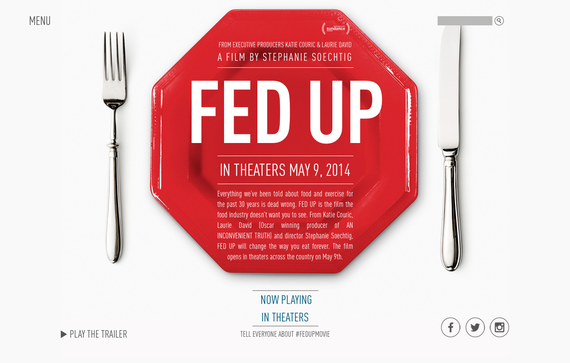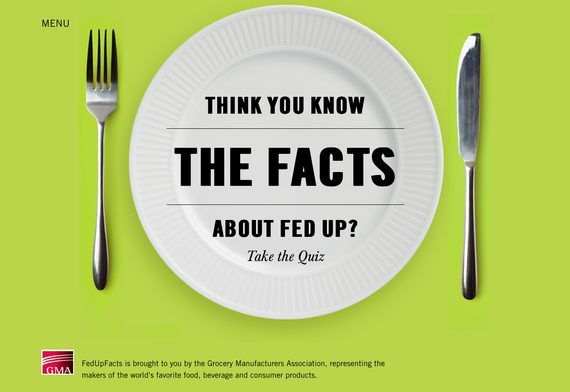A few weeks ago, I reviewed the documentary Farmland, which follows six young farmers and ranchers attempting to inject new blood into an industry where the average age keeps rising while their overall numbers are dropping. While I felt the film did a good job of showing how challenging modern farming has become, something about the film didn't feel right to me.
With more and more Americans questioning where their food comes from and if it was humanely raised, responsibly grown, and is free of potentially harmful chemicals, Farmland largely whitewashes or dismisses these topics. All of the meat producers (and, we're to assume, all meat producers) are against animal cruelty and the overuse of antibiotics and hormones, while organic vs. conventional and GMO vs. non-GMO agriculture are simply portrayed as distinctions without differences that largely come down to a farmer's personal preferences and market conditions. Other hot-button issues, like the overall unsustainability of "conventional" farming and pollution caused by fertilizers and pesticides, are completely ignored.
I thought the treatment of these topics was director James Moll's misguided attempt to keep the focus squarely on the farmers. But after posting my review, a friend pointed me to a story that located the source of my bad vibes -- it turns out Farmland is a propaganda piece paid for by Big Food. From NPR:
Farmland was funded by the U.S. Farmers and Ranchers Alliance (USFRA). This group was formed in response to recent movies and books like Fast Food Nation, which warned consumers off factory-farmed ground beef.
The alliance includes state farm bureaus and agribusiness giants like Monsanto, whose genetically engineered seeds were targeted for criticism in the film Food Inc. Randy Krotz, with the Farmers and Ranchers Alliance, says they felt it was time to make their own movie.
A post critical of Farmland on Civil Eats points out that other members of USFRA include John Deere, DuPont Pioneer, the United Soybean Board, and the National Cattlemen's Beef Association.
I really wish I'd known this before I posted my review. But the tricky thing is that much of Farmland doesn't feel like propaganda, particularly in its portrayal of how demanding a career in farming and ranching is and how it causes many to live on the edge of bankruptcy. If anything, Farmland seems more like an effort to dissuade the naïve or idealists from entering farming unless they have a passion for the work and understand how all-encompassing and financially risky it really is. Then again, I'm sure members of USFRA want potential farmers and ranchers to know what they're getting into, though Farmland gives a convincing answer to why more young people don't pursue careers in agriculture.
But as food and culture writer Michael Pollan brings up in the NPR story, Farmland is actually an attempt by USFRA to create a straw man to protect industrial agriculture's worst offenders.
"It serves the interests of the large corporations that are really under attack to put the farmers in front of them, and say that it is the farmers being attacked, not a set of practices, not a ... highly concentrated industry, not monopolistic seed merchants, all the things that are the real targets," Pollan said.
When people like myself criticize aspects of the industrial food system, we're criticizing the system itself and the companies that benefit from it at the expense of the environment, nutrition, and future generations -- not the farmers and ranchers who are forced into the "go big or go home" mentality needed to compete with large corporate farms. The need to expand inevitably leads to more mechanization, more animal cruelty, and more chemicals, GMOs, hormones, antibiotics, etc. It's hard not to feel sympathy for family farmers caught in a system that forces them to embrace whatever advantage they can -- even ones they find harmful or inhumane -- to keep them a step ahead of going broke.
But in the straw man argument used in Farmland, it's the nice farmers and ranchers themselves -- not the system and those that created it -- that are under attack and are being misrepresented in the media (the liberal one, I presume). As Sutton Morgan, the film's large-scale organic farmer says,
"Most people have some sort of idea, maybe from television or something, that there's bulldozers and tractors, just clouds of smoke going and destroying ground and destroying habitat. But they don't understand that our environment, which is our ground, has to be in good condition, otherwise you can't be a successful farmer."
Television teaches viewers that farming is done with bulldozers and fire? I don't think anyone believes that, but it's an exaggeration that serves to criticize the (liberal) media for something it didn't say while omitting that industrial farming is indeed done primarily by bigger and increasingly expensive mechanized farm equipment spewing not smoke, but clouds of pesticides, herbicides, fertilizers, and exhaust. And while it's true that an organic farmer like Morgan needs to rely more on the health of his soil, conventional farming primarily uses soil as simply a plant holder, with a plant's nutrition coming from fertilizers since the soil's nutrition has been stripped from the soil through the repeated planting of the same crop, while beneficial organisms have been killed off by pesticides.
But since the food industry and big agriculture aren't constantly producing their own movies, what do they do about documentaries that are willing to question their methods, their priorities, and the negative outcomes that result?
The recent documentary Fed Up (my review here) provides a good example of an industry's typical reaction when an activist filmmaker takes them to task. First, there's an official response in the form of a press release (often before the film has been released) that attacks the film for being misleading, cherry-picking in its use of data, or outright dishonest while touting how beneficent the besieged industry is, evidenced by all of the good-faith efforts they've made to combat obesity and its related illnesses, without ever admitting or apologizing for the fact that the industry itself caused the problems in question. The statement by the Grocery Manufacturers Association does all those things.
Then, a website created by the besieged industry appears purporting to provide "the facts" that the attacking film gets wrong, and the GMA has one of those. But in a less common move (though not unusual, at least for republicans), the GMA's anti-Fed Up site has been made to closely resemble the official website for Fed Up. The GMA claims this was not meant to mislead visitors into thinking they were at Fed Up's actual site, but you can judge for yourself.
So with Farmland and Fed Up, we see two reactions by Big Agriculture and Big Food to documentaries sounding the alarm about America's systemic problems with food, from how it's produced, marketed, and regulated to its final impact on eaters suffering from a growing list of ailments. But both responses are ultimately problematic in their attempts to address systemic problems that they never admit actually exist. Farmland discusses the challenges faced by a dwindling number of young farmers without criticizing a system that increasingly favors large, industrial, corporate-owned farms that can afford expensive equipment, seeds, and chemicals, while whitewashing how harmful this system is to the environment and people. The reaction to Fed Up attempts to highlight the food industry's solutions to problems the food industry won't admit they created and, in most respects, have little interest in solving.
Follow more of my adventures in urban gardening, sustainability, and environmentalism at YouShouldBeGardening.com.

